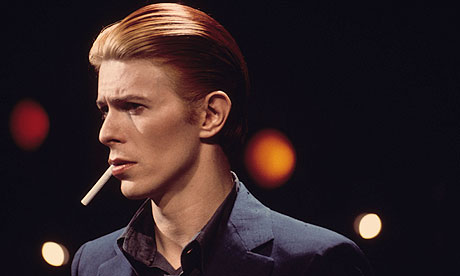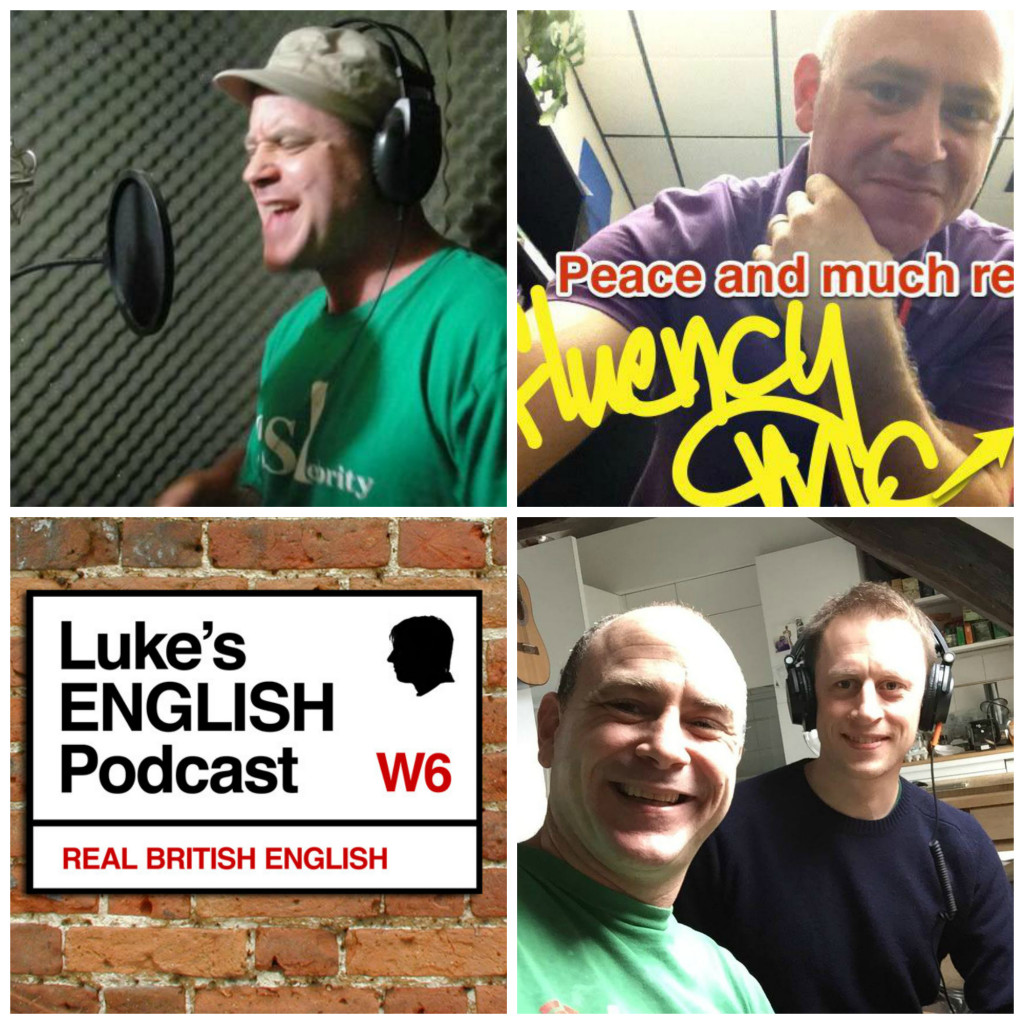Learn some music-related idioms. Full Transcript available below.
 Right-click here to download this episode.
Right-click here to download this episode.
Learn English! Some music idioms for you to use. Luke’s English Podcast is a free service for everyone in the whole world to use. Download the podcast, listen, laugh and learn. Get new vocabulary, listening practice, pronunciation drills for speaking and some interesting cultural information. Email me at luketeacher@hotmail.com. You can also find me on Facebook and Twitter.
This podcast is about music idioms. Idioms are difficult because they are fixed expressions. The individual words mean something different on their own. You have to learn the meaning of the complete expression. Here are some useful ones that relate to music in some way. You can use them to talk about anything.
The idioms
- it rings a bell
- to pull out all the stops
- to play it by ear
- it’s music to my ears
- to be fit as a fiddle
- to face the music
- to change your tune
- to blow your own trumpet
Here are the transcripts of the badly acted dialogues (sorry about the terrible American accents):
A: Have you ever met Jack Miller?
B: Well the name rings a bell
A: He work in the Nakatomi Plaza
B: Oh yes, I remember. He was the guy who sealed the OCP contract. He wouldn’t stop blowing his own trumpet about it.
A: Yes, he kept going on about how he’d closed the deal, saying how Cyberdine were going to be the number 1 agency in the country.
B: Yeah, what a pain in the neck
OK guys! Summer is the busiest time of year for us. Lots of tourists with their £50 notes. What they really need, is London souvenirs. OK, so pull out all the stops this month. I want you to SELL SELL SELL. More British flags, more models of Big Ben, more photos of the Queen, more toy London busses, more postcards of punks, more Beatles T-shirts, more London Eye photos, more We Will Rock You tickets, and more umbrellas!!
A: Sir?
B: Yes?
A: It’s Miller. We’ve closed the OCP deal.
B: Oh, that is music to my ears! I can’t tell you how important it is to Cyberdine.
A: No sir, you don’t have to tell me.
B: Excellent!
A: Hey Miller!
B: Yeah?
A: Are you going into the OCP negotiation?
B: Well, yes I am.
A: Don’t you need your notes? Where’s your file?
B: Oh, I don’t really need them
A: How are you going to manage the negotiation without them?
B: Oh, I’ll just play it by ear
A: Well Miller…
B: Yes Doctor?
A: I’m pleased to tell you that you have a clean bill of health. You’re fit as a fiddle! It’s quite surprising really considering your age. I expect you have the body of someone half your age. How do you do it?
B: Well, just lucky I suppose
[terrible, unforgivable acting]
A: Hey Miller! The board is furious! They say you screwed up the OCP deal. They say Cyberdine is in jeopardy.
B: Damn it! Did they say anything else?
A: Yeah, they say they want to see you immediately. Time to face the music Miller.
B: I suppose so…
Serious APOLOGIES for the bad acting and for the slightly offensive American accent. I do like America, and mimicry is the sincerest form of flattery (apparently).
Here are the idioms and their definitions:
it rings a bell – it’s familiar, or it reminds me of something
to pull out all the stops – to do everything you can to achieve a result
to play it by ear – to improvise, to not follow a plan
it’s music to my ears – it’s exactly what I wanted to hear
to be fit as a fiddle – to be in perfect health
to face the music – to accept the negative consequences of what you have done
to change your tune – to change your opinion of something, and the way you talk about it
to blow your own trumpet – to go on about or boast about something you did well or are good at
That’s it folks! Cheers, bye bye bye bye bey bye bey bey bye bye bey bey bey bey bey
24. Music Idioms – Transcript
You are listening to Luke’s English podcast. For more information visit teacher Luke.podomatic.com (teacherluke.co.uk)
Hello, folks and welcome to another edition of Luke’s English podcast. Now, the last podcast I did was about music festivals. So, I thought that I’d stick with the theme of music this time and teach you some music idioms.
Now, just a little note about idioms. Of course, an idiom is a kind of fixed expression that, you know, is used a lot in general conversation. Now, they are quite tricky because the meaning is difficult to understand. If you try to understand the individual words one by one in an idiom you probably won’t understand the idiom. It’s very difficult because the idiom as a whole has a different meaning to the individual words. So, for example if you look in a dictionary and try to understand the expression word by word you won’t understand anything. It’s got a different meaning as a fixed expression.
So, I’m going to teach you some idioms that are sort of related to music in some way and I’ve selected these ones myself, handpicked them to make sure that I was teaching you idioms which are actually quite useful because some of the idioms that you learn are not really useful.
There are so many that some of them are not used very often or are a bit old-fashioned and I think these ones are okay.
So, the idioms I’m going to teach you and you’ll be able to read all of these idioms with transcripts on the web page. So, the idioms of this….and I’m not going to tell you what they mean, yet. First I’m just going to read the idioms to you and then I’m going to read you little dialogues that include the idioms and then at the end I’m going to explain what the idioms mean. Okay?
So, the idioms then, one by one.
First on is: it rings a bell or that rings a bell. Right?
Next on is: to pull out all the stops- to pull out all the stops. To pull out all the stops
Okay? So that’s it rings a bell and to pull out all the stops.
The next one is: to play it by ear – to play it by ear. Right? To play it by ear. Right?
The next one is: It’s music to my ears – it’s music to my ears. Right? Okay?
The next one is: to be fit as a fiddle – to be fit as a fiddle – to be fit as a fiddle. Okay?
The next one is: to face the music – to face the music.
The next one is: to change your tune – to change your tune or to change your tune. Right?
And the last one is: to blow your own trumpet – to blow your own trumpet – to blow your own trumpet. Okay?
So, don’t worry if you don’t know what those idioms mean and don’t worry about trying to understand the individual words necessarily because sometimes they don’t really help you.
So what I’d like you to try and do now, is listen to these little stupid dialogues that I have written which I’m going to perform. They’re not very good dialogues and I’m not a very good actor but I’m going to try and perform the dialogues to you to make it more realistic or interesting. And as you listen to the dialogues try to notice the idioms that I’ve used and try and guess what they mean from the context of the situation. Okay? Don’t forget at the end I’ll explain what they mean. Alright?
So, I’m going to start with the first dialogue.
All these dialogues are in some way related to work, basically.
It’s a kind of work themed situation in which a man had to do a negotiation to win a contract, and what happened. Okay?
So, here we go. Here is the first part of the dialogue.
Have you ever met Jack Miller?
Well, the name rings a bell.
He works in the Nakatomi Plaza
Oh, yes, I remember, it was the guy who sealed the OCP contract. He wouldn’t stop blowing his own trumpet about it.
Yes, he just kept going on about how he’d closed the deal, saying how Cyberdyne were going to be the number 1 agency in the country.
Yeah, what a pain in the neck!
Okay, that was my first dialogue. I do apologise for the terrible acting but there is nothing I can do about it. I am not a professional actor. I am a teacher, so I’m just doing the best I can. Anyway, I hope you managed to catch the idiom there. It was to blow your own trumpet.
He said, he wouldn’t stop blowing his own trumpet about it.
Okay, the next situation, if you can imagine is like in a big souvenir shop in the centre of London in the summer time. Okay? And this is like a motivational speech by the sales manager of the souvenir shop. Okay? Here it is:
Okay, guys! Summer is the busiest time of year for us. Lots of tourists with their 50 pound notes. What they really need is London souvenirs. Okay? So pull out all the stops this month. I want you to sell, sell, sell. More British flags, more models of Big Ben, more photos of the Queen, more toy London busses, more postcards of punks, more Beatles T-shirts, more London Eye photos, more We Will Rock You tickets, and more umbrellas!!
Okay, so that was the souvenir manager and the idiom there was…oh, what was it? The idiom was there – the idiom there – uh, I can’t speak.
I’ll start again: The idiom there was to pull out all the stops. Right? Okay!
Now, the next one is back with the story of Jack Miller and the negotiation.
Sir?
Yes,
It’s Miller, we’ve closed the OCP deal.
Oh, that is music to my ears. I can’t tell you how important it’s to Cyberdine.
No, sir, you don’t have to tell me, sir.
Excellent!
Okay, I’m getting kind of embarrassed now because I realised that these little dialogues are just awful, I think. I am not very pleased with them. I think they sound terrible. My acting is awful and my accents are really rubbish. But I’m gonna keep doing it because I’ve started it now, so I’ve got to finish. Anyway! That idiom was: that’s music to my ears. That’s music to my ears. Okay?
Okay, here is the next dialogue! Here we go, more bad acting and even worse accents coming right up:
Hey, Miller
Yeah?
Are you going into the OCP negotiation?
Well, yes I am
Don’t you need your notes? Where is your file?
Oh, I don’t really need them.
How are you going to manage the negotiation without them?
Oh, I’ll just play it by ear
Okay, I think this is a pretty awful and embarrassing mainly because of my acting. I thought that I was a bit better than this but clearly I’m not. I’m rubbish in acting. But, that’s not important. The important thing is that you learn some English. Isn’t that right? I think so.
So, yeah, the idiom there was I’ll play it by ear, to play it by ear. Right? Okay!
So there are two more dialogues and here is the next one.
It’s in a doctor’s surgery, so our man, Jack Miller is going to the doctors to get a check up. Okay, so here it is.
Well, Miller
Yes, doctor
I’m pleased to tell you that you have a clean bill of health. You are fit as a fiddle. It’s quite surprising really, considering your age. I expect you have a body of someone half your age. How do you do it?
Well, I am just lucky, I suppose
More bad acting for you there. A kind of posh doctor character. Anyway! the idiom there was: You’re fit as a fiddle. You’re fit as a fiddle. Okay?
Now, here is the last dialogue and the last of my terrible performances. Here we go. It’s back to the story of Miller and the negotiation.
Hey, Miller, the board are furious. They said you screwed up the OCP deal. They say Cyberdine is in jeopardy.
Damn it! Did they say anything else?
Yeah, they say they wanna see you immediately. Time to face the music Miller.
I suppose so.
So, that’s the last dialogue. I hope you enjoyed the story of Miller and the negotiation and, yeah, sorry about the awful acting. Next time I’ll get, you know, Johnny Depp and Robert De Niro and Al Pacino and Christopher Walken to come and perform one of my dialogues.
I think maybe next time I’ll do Christopher Walken and Robert de Niro. I think that will be quite a good combination. So, anyway the meanings of those idioms …well, actually in the first dialogue there were two idioms. That was: It rings a bell and he kept blowing his trumpet. Right?
So it rings a bell means it’s familiar – I think I remember it. It’s familiar or reminds me of something. So, if someone says something like: Oh, do you know Jack Miller. And I say “the name rings a bell”. So, it’s like there is a little memory of it in the back of your head. But you can’t really remember it. It’s like a little bell ringing in the back of your head. So, his name rings a bell. Right? So, it’s familiar.
The other one in that first dialogue was to blow your own trumpet. To blow your own trumpet. And that’s basically to boast about how good you are. So if you keep going on about how great you are you are just blowing your own trumpet. Okay? Right!
In the next dialogue we had to pull out all the stops. To pull out all the stops. It was, okay pull out all the stops this month. And if you pull out all the stops it comes from….well, pull out all the stops means you do everything you can in order to achieve the results that you need. So, you kind of go full power into your work. You pull out all the stops. Now, that comes from old organs like church organs which use pipes and to get the loudest sound of your organ, you would pull out all the stops and stops are like little buttons that you can pull out or press in and they change the sound of the organ. So, if you pull all of the stops out it makes a really loud sound of the organ, so now we use the expression to pull out all the stops to mean to do something full with all our power. You know, to do everything you can in order to achieve the result, right?
Now, the other idioms like I just said: It rings a bell. Well, a bell is like a little thing you have at the top of a church. Ding, ding, ding, ding like that, okay? So it rings a bell. Like I said it rings a bell in the back of your head like a memory.
The other one is to blow your own trumpet. So, a trumpet is a musical instrument which you blow into. I am sure you know what a trumpet is. If you don’t know what a trumpet is I’ll play you a little bit of trumpet. I don’t play the trumpet but I’m gonna play you a little bit of someone else playing the trumpet. Here it is:
trumpet music
Okay, so that was a trumpet being played. That was actually Donald Byrd there. A great trumpet player. So, to blow your own trumpet means to go on and boast about how great you are. Okay? To blow your own trumpet.
Okay, in the next dialogue we had: That’s music to my ears, that’s music to my ears and if you say that when basically someone has said something that is exactly what you wanted to hear. It’s exactly what you wanted to hear. So, something that makes you very happy. That’s music to my ears. Okay?
Now, the next one was….let’s see….I’ll just play it by ear. I’ll just play it by ear and in that one Miller’s colleague said to him: How you are going to manage the negotiation without your notes and Miller said: I’ll just play it by ear. So, to play it by ear means that…eh….let’s see ..you improvise you don’t follow a plan. You just react to whatever happens there. So, Miller is going to go into this negotiation without his notes. He’s not going to use a plan, he’s just going to react as things happen. He is just going to improvise. Okay? So the origin of that to play it by ear is a bit like: when you play a piano when you play a piece of music without music, without sheet music. You are not reading the music you are just playing it by ear. Okay? So, that’s where that comes from. At least we use that expression to say when you do something without planning, you just improvise. You play it by ear. Okay?
So, in the next dialogue, we had….you are as fit as a fiddle. And that’s what Miller’s doctor said to him. You are fit as a fiddle which means you are very healthy. You are in perfect health. To be fit means that you are healthy. You are —you know, you do lots of exercise and your body is in good condition. But if you are fit as a fiddle it means you are really, really healthy. And a fiddle is another word for a violin. So, I am not sure why they say fit as a fiddle. Why is a violin fit? I don’t know. Maybe it’s because the strings are tight and it’s kind of …I don’t know, in good condition or something. But fit as a fiddle. Here we go.
And in the last dialogue we had: time to face the music, to face the music.
Now, if you face the music it means you accept the negative consequences of your actions. You accept like if you don’t… something that caused a really bad reaction you have to just accept that and just face it. For example when lots of people are angry about a decision you made and they are in a room and they are all angry, you just go in there and speak to them. You need to face the music. Right? Okay!
So, that’s it. Actually I’ve just realised, I realised something at the beginning of this podcast I said that I will teach you all of those idioms like it rings a bell, to pull out all the stops, to play it by ear, it’s music to my ears, you are fit as a fiddle, to face the music, to blow your own trumpet and to change your tune. But I didn’t explain to change your tune. I’ve just realised that.
So, basically you change your tune, you change your opinion of something. Change the way you talk about something. So, for example if maybe one month John always talks about – I don’t know – “U2, like the rock band U2 if usually he says: Ah, U2 are rubbish, they are boring, you know, they are not very good at music, their songs are really bad and Bono can’t sing and he’s really annoying. So, I hate U2” and when that’s what for example John says about U 2 and then, like the next day after he listened to one of their songs, the next day he says: “Do you know what, U2 are really good actually, yeah. I think, you know, possibly one of the best bands in the country in the moment. As a matter of fact, I’ve purchased 2 tickets and go to see them life in concert.” Right?
And you would say to him: “What are you talking about, John? You’ve changed your tune. I thought you hated U2.” Right? So, to change your tune is to change your opinion of something and to change the way you talk about something.
So, that’s it!
So, I hope those idioms are useful for you. Let me give you actually just a couple of drills for those …just drills for those idioms. Okay?
So, these are just sentences I’m gonna read to you. I’d love you to try and repeat them. It’s good practice for your pronunciation. Think about how all of the words in the sentences are linked together when I say them and try to copy it. Okay!
Here is the first one:
His name rings a bell.
We’ve got to pull out all the stops.
I’ll just play it by ear.
That’s music to my ears.
You’re fit as a fiddle.
Time to face the music.
You’ve changed your tune
Don’t blow your own trumpet
And that’t it for this episode of Luke’s English podcast. I hope you enjoyed it. I hope you’re using these drills to practice your pronunciation.
That’s it for me and have a very nice day.
Cheers buy, buy, buy, buy, buy
Hi, folks
You are listening to Luke’s English Podcast. That’s right, this is Luke. I’m just sitting here right now, playing the piano. I play the piano maybe three, four times a day. Sometimes, if I have the time and I’m not teaching English or doing a podcast. I came up here to start playing the piano. Kind of makes me feel good. I am sure it makes everyone else in the neighbourhood feel good. I know my neighbours particularly enjoy the piano playing all hours of the day. Sometimes they bang on the ceiling there, just out of pure enjoyment I think. They sure love it when I play the piano.
So, I just thought I’d play this short piece for you right now. Just to give you another side of my personality, ladies and gentlemen.
And I’ll be doing another podcast for you real soon so until then have a very, very nice week. I’ll catch you soon. Thanks a lot, good night!
![]() [DOWNLOAD]
[DOWNLOAD]











